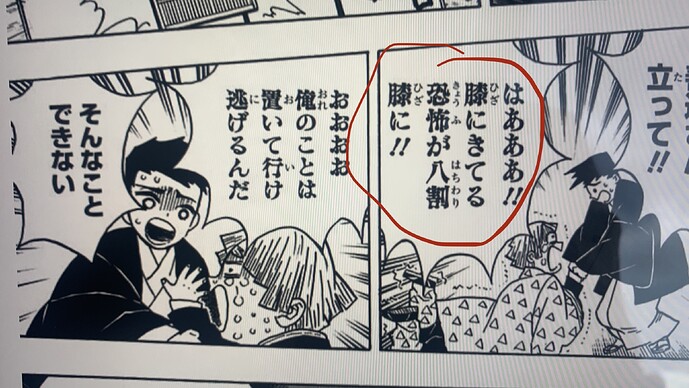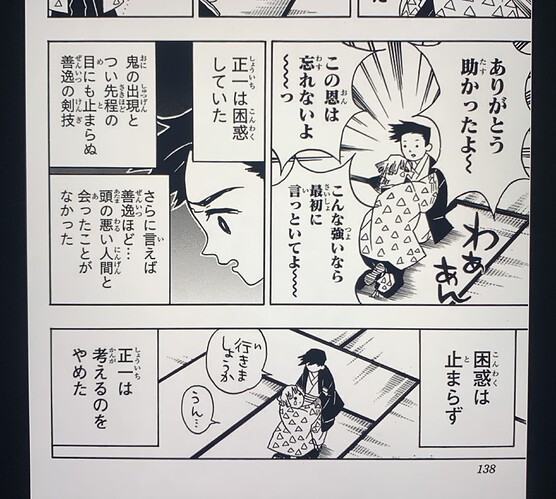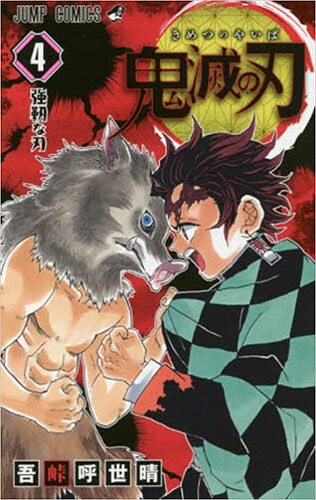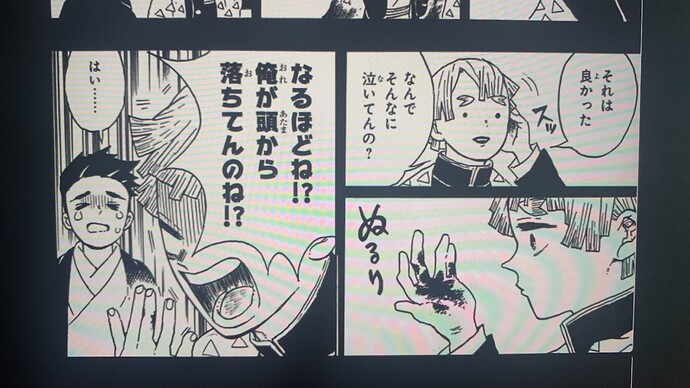I think more “If you leave it behind I’ll be miserable”.
For extra context, it is his sister inside the box (supposedly sleeping and vulnerable)
I feel like I have to explain why in the world Tanjiro put his sister into a box now… she’s a demon who can change body size, and since demons die instantly after exposing to sunlight, he travels carrying her into this box. She was left there outside the building he entered so to guard the two children that were left outside
3..23.129.3
This zenitsu’s sentence is quite unintelligible to me… I understand till 膝にきてる恐怖 but can’t connect it with 八割, what is this?? I know 八割方 means 80% or so/ probably/something along these lines, but what the hell is it doing here?
I’d translate the first part till が as “the terror that is coming (来てる?) at my knees”
(Apologies if it’s incomprehensible, I’m writing with 3 hours sleep/9 hours work shift/ anti-pollen meds (very sleepy) and am on my bus ride back home)
膝に来てる! It has come to my knee
恐怖が八割膝に(ある) !! The fear is 80% in my knee!
Edit: I guess it could also be one sentence 膝に来てる恐怖が… but it seems more natural to me to say first 膝に来てる alone. Also 膝に来てる ends at the bottom of the bubble. But I’m not sure and the meaning is almost the same anyway.
Edit2: The next panel has a similar issue, I’m pretty sure it’s two sentences 俺のことは置いて行け!逃げるんだ!(another command-like のだ btw). It’s a bit annoying that there is no exclamation point or something.
Wow, this speech bubble is a mess ![]()
The second speech bubble was quite easy to understand to me tho. The first one, I saw it as your first edit, but your second edit makes perfect sense as well
3.23.138.5-6
Previous context: Zenitsu and that kid were about to be eaten by a demon. Zenitsu is so frightened and overwhelmed by the sense of responsibility of having to protect that kid, that ends up passing out. Suddenly he stands up (in his sleep) and easily and quickly kills the demon. He has a sort of quality that when he’s asleep he becomes a very skillful swordsman. After the shown panels there are more square bubbles with description of the narrator about Zenitsu’s skills while being asleep.
I’m having problems translating the last three speech bubbles.
- さらに言えば善逸ほど → how should I think about it? I can’t understand its meaning. When I look up the ば〜ほど grammar points, a lot of very easy sentences including examples as XすればするほどY appear, and I don’t have problems with that, but here it’s not as linear and simple as that. I guess the problem is a bit the noun Zenitsu and a bit what precedes the grammar point: さらに (furthermore). Anyway, I’d translate it as “Furthermore, as much as Zenitsu… he had never met someone that dumb.”
2.困惑は止まらず・正一は考えるのをやめた
→ have no clue what it means. Literally maybe: “as for perplexity, without (it) stopping, as for Shoichi, he stopped thinking.” or something like “Shoichi kept being perplexed (by the situation or something)”?
善逸ほど頭の悪い人間と会ったことがなかった is “he had never met anybody as stupid as Zenitsu”. The さらに言えば is not part of the same grammar construct – it’s a standard sentence-starting phrase that means “furthermore”, “moreover”.
八割方 can also mean almost certain or something to that effect. I think Zenitsu is whining, again, that he’s so terrified that he can’t walk. I think a good rule that has helped me with reading, is to not try to translate what every word means, but try to get a rough idea of what they are trying to say. Especially because manga like 鬼滅 will occasionally use a lot older style Japanese.
Although here it was just 八割, so by itself it conveys the same meaning? I suppose it’s like saying “eight times (out of ten)” without saying the last part, the meaning is the same because it’s clear by context that your talking about probability (to make an example)
The problem is, I don’t even know when it’s modern grammar and when it’s archaic. Although I’m beginning to make myself an idea. I hope I don’t confuse keigo with archaisms now ![]()
I think in this case it conveys the same meaning because saying 80% of your fear is in your knees seems kinda silly. I think this is one of the cases where its better to translate ideas rather than going for word for word translation, especially if you own the manga because you can always read it again.
I wouldn’t say the Japanese in 鬼滅 is archaic, but it definitely is a little older, and some of the characters speak a little more formally than you would in normal Japanese. Some of the kanji is also a little different too. You might have noticed that the attack names use the older numeral kanji than modern Japanese, for example.
Indeed in the first three volumes I have noticed all this already, also yes I meant outdated rather than archaic - after all if I’m not wrong, the story is set some years before world war 1 (with no correlation to it, as far as know).
Let’s go with volume 4 of this masterpiece! ![]()
Took me a bit to end volume 3 since it happened in the middle of my working week and had few time. Hope I’ll have plenty of time to read in the weekend ![]()
4.26.7.1
Zenitsu thinking*
寝てる間に人が話してたことを知ってる時があって気味悪がられたっけ
I interpret this as Zenitsu describing that there were times when he knew what people around him had said while he was asleep, but I’m not sure about who was creeped/scared by this. More precisely, about がられる (がる). Is other people being creeped by this Zenitsu skill? Is him being creeped by the fact he can do it?
Edit, also
I had to search quite a bit for 強靱 (強靭な刃 in the cover page). At first I was seeing a 月 on the right; then I thought it could be an old script 立刀(刂 )… I think it is the first time I see a kanji with 刃 on the right side.
I wish I had your experience to see such details dude😂
Mmm, maybe in the sense that the head comes down first then the rest of the body
(イタリア語でも「cadere di testa」と言うのがあるね)
It’s so nice to be able to receive examples with my native language sometimes ![]() anyway, woah, I didn’t realize that
anyway, woah, I didn’t realize that
Yeah, it’s like “falling head-first”. Note that 頭から落ちる can also mean “something falls off your head” (eg I found an example about a sweatband the user liked because 頭から落ちる汗が防げる…)
This is the first thing I thought when I met it. But now it suddenly makes sense - head first - then the rest ![]()



